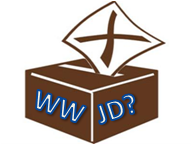The weakest link?
“You are the weakest link – goodbye!”
Watching the seven-way leaders’ debate recently, I couldn't help but think it looked very much like an episode of ‘The Weakest Link’, the quick-fire general knowledge quiz hosted by the formidable Anne Robinson in which contestants decided at the end of each round which of their number should be eliminated.
In this contest, it is the public, however, who determine, at the ballot box, how well the candidates do. By the time you read this, the nation may already have decided who is the strongest and the weakest link, and who leaves the competition with the prize.

Humans have experimented with a mind-boggling variety of forms of government, from royal succession, military coup, to the myriad versions of democracy. In an imperfect world, no system of government is perfect, but it is usually thought that democracy is the least bad option. But given that we, the people, then have to decide who governs, how should we choose where to place our cross?
We certainly shouldn’t go for the party leader or candidate who is the most photogenic, delivers the best speeches, or is able to turn on the charm. Many terrible leaders of the past have had oodles of charisma. Equally, we shouldn’t feel pressured to follow the crowd, or the expectations of family or friends. Many a bad decision is made as a result of peer pressure and not being true to oneself. We should instead – to the best of our ability – choose according to our consciences, informed by good sense, and concerned for the common good, and not our own vested interests.
The Apostle Paul wrote to the Philippian Christians, ‘Do nothing out of selfish ambition or vain conceit. Rather, in humility value others above yourselves, not looking to your own interests but each of you to the interests of the others’ Philippians 2:3-4
That should characterise our approach to voting, but also characterise the individual or party that we choose.
Some Christians wear bracelets with the initials ‘WWJD’. It stands for ‘What Would Jesus Do?’, a good ethical guide in any situation. The passage I quoted from above goes on to say ‘what Jesus actually did’: ‘In your relationships with one another, have the same mindset as Christ Jesus: who, being in very nature God, did not consider equality with God something to be used to his own advantage; rather, he made himself nothing by taking the very nature of a servant’ Philippians 2:5-7
Jesus made himself a servant. The word ‘minister’ has the same meaning as ‘servant’, and a “Prime Minister” must surely therefore be one who is the foremost in serving others.
Jesus is the ultimate leader – at the same time a king, a military victor, and one chosen by individuals to be their Lord – and if we are wise we will choose as our ruler one who has the same servant “mindset”.
Whilst on the cross, Jesus was derided for weakness. Servants can sometimes seem weak, but Jesus in his life, death and resurrection demonstrated that seeming weakness can actually be the greatest and most loving demonstration of strength.
So this General Election, place your cross where Jesus placed his. Let your cross show your love.
Revd Dr Jonathan Mobey
Rector of Harwell and Chilton
May 2015